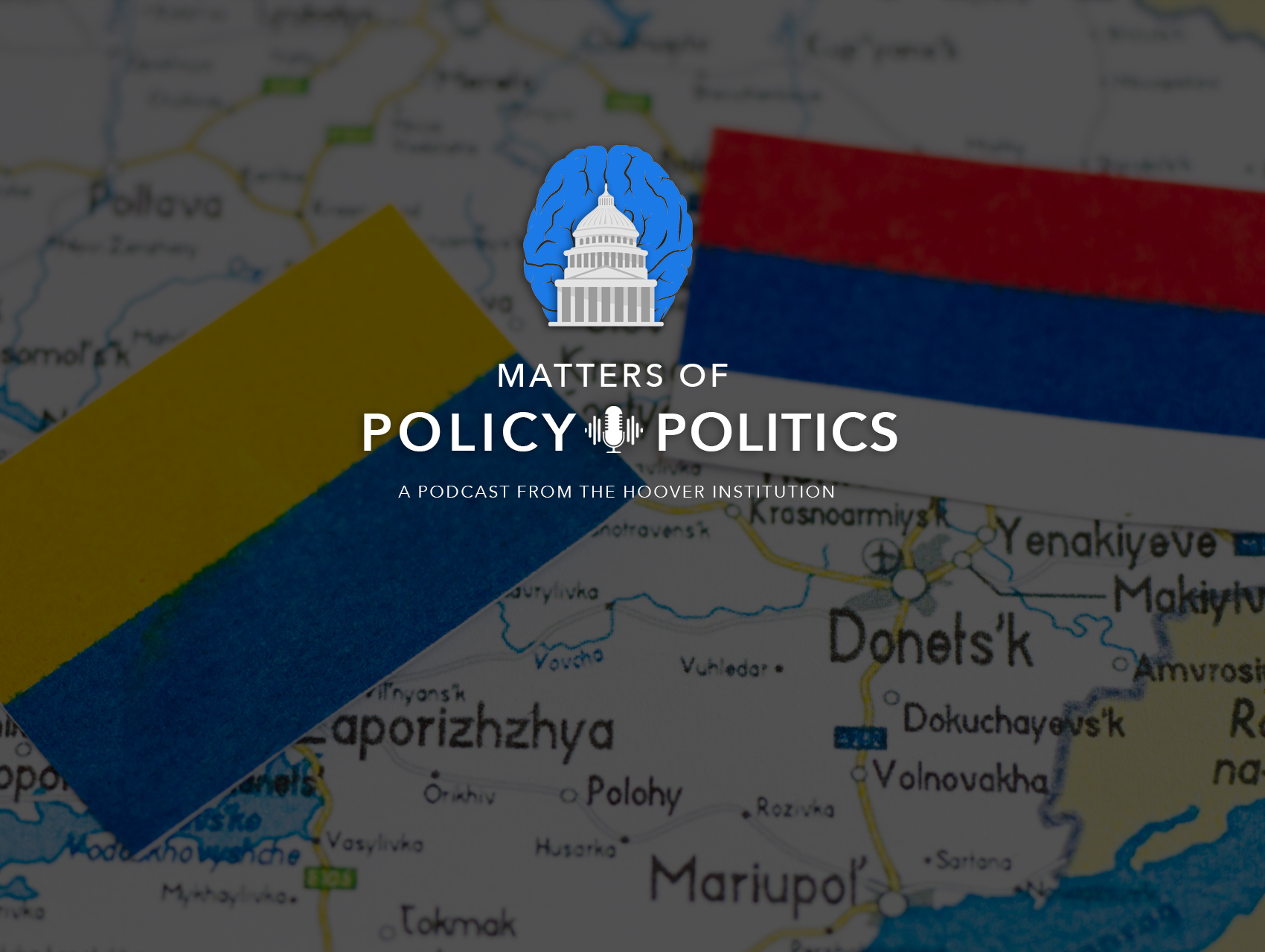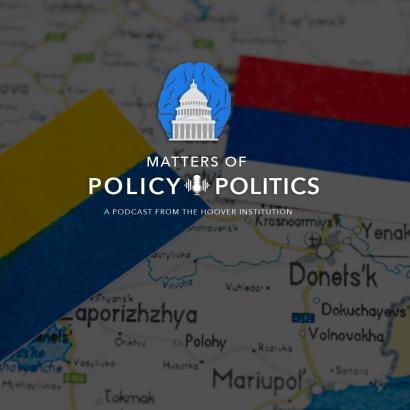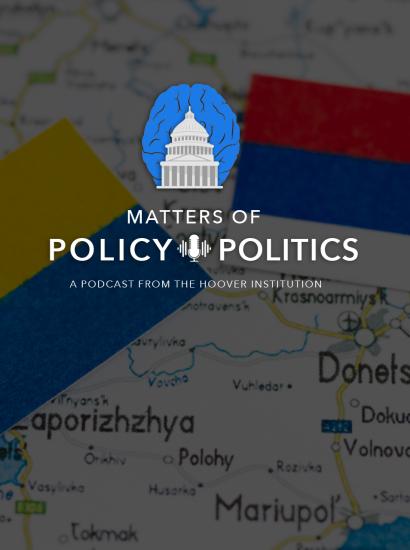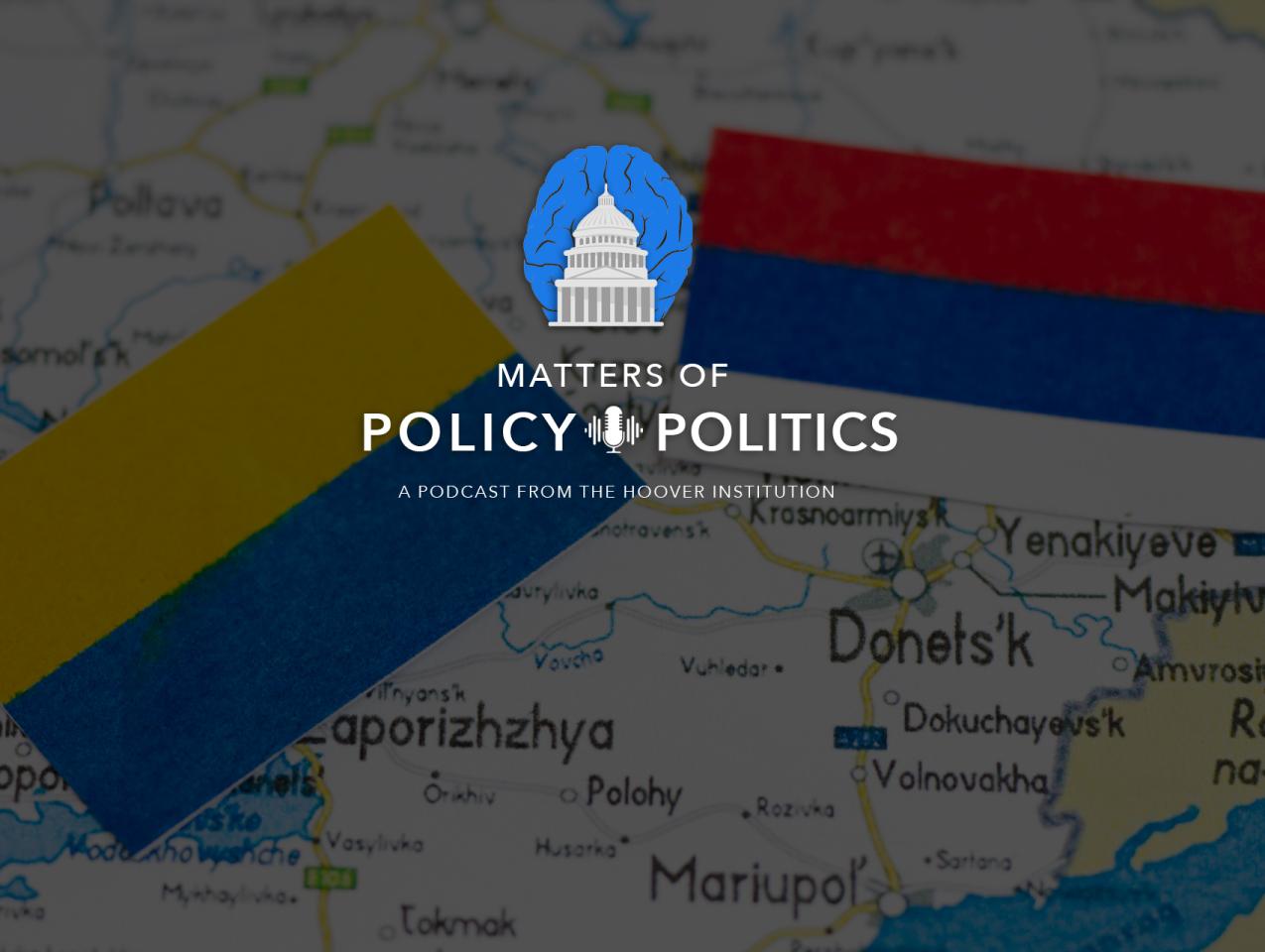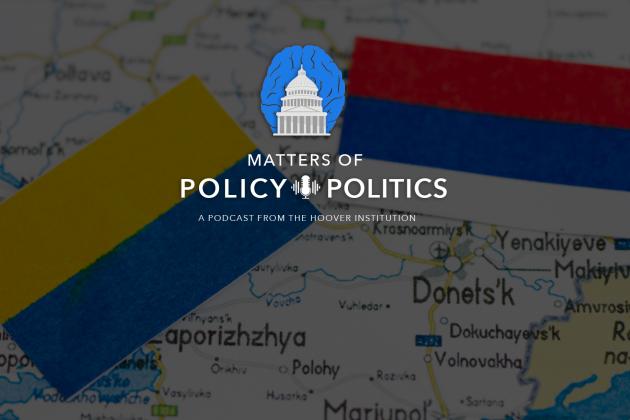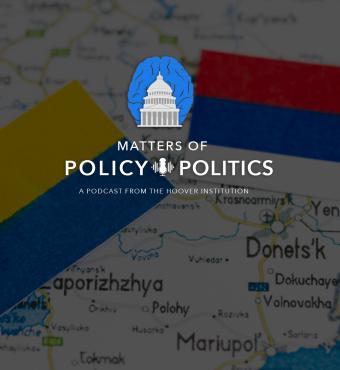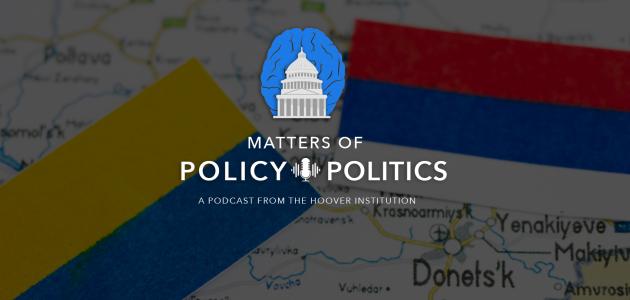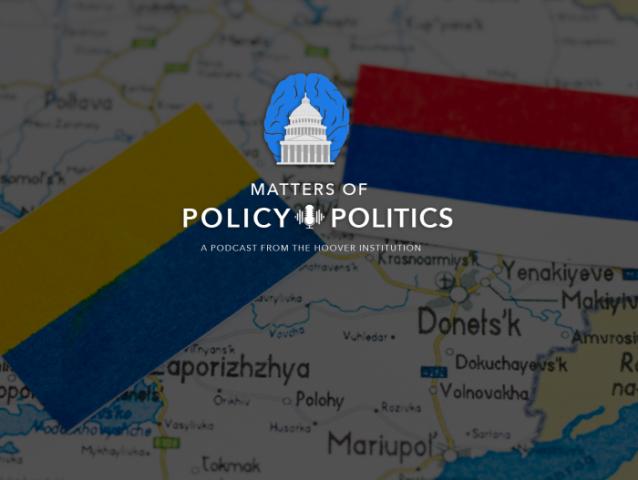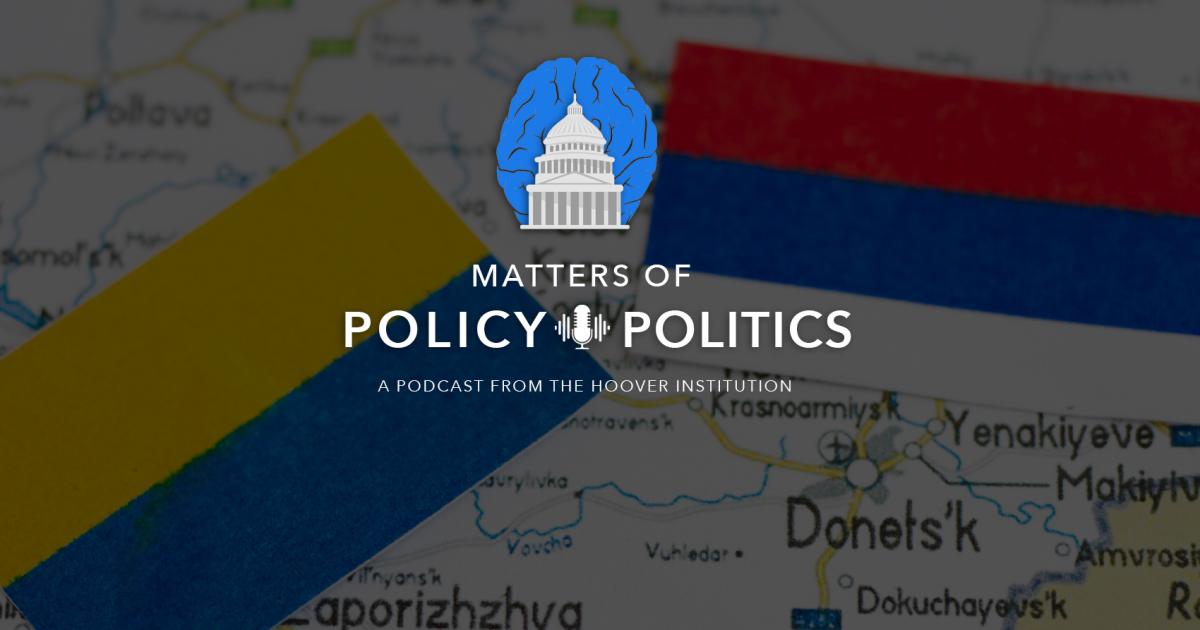The Russia-Ukraine war is less about resources and more about empire, history, and two nations’ self-conceptions. Or so contends Norman Naimark, a Hoover Institution senior fellow and Stanford University history professor, who discusses how past and present cruelties involving the two combatants – common heritage, absorption, suppression and genocide, Vladimir Putin’s mindset, and the Ukrainian people’s resilience – factor into the past 19 months of fighting.
>> Bill Whalen: It's Thursday, October 5, 2023, and welcome back to Matters of Policy and Politics, a Hoover Institution podcast devoted to governance and balance of power here in America and around the globe. I'm Bill Whalen, I'm the Hoover Institution's Virginia Hobbs Carpenter Distinguished Policy Fellow in Journalism. But I'm not the only Hoover fellow who is dabbling in podcasting these days, just don't take my word for it.
I suggest you go to the Hoover Institution's website, which is hoover.org. Click on the tab at the top of the homepage, it says commentary. Head over to where it says multimedia, and up will pop about a dozen plus audio podcast, including this one, which is at the top of the list.
And humble brag, I think it's at the top of the list because I endeavor to get the best and brightest of the Hoover Institution on this podcast, today's show being no exception. My guest is Norman Naimark, Norman Naimark is a senior fellow courtesy at the Hoover Institution, the Robert and Florence McDonnell Professor of East European Studies at Stanford University, and a senior fellow at Stanford's Freeman Spogli Institute.
Professor Naimark is an expert in modern East European and Russian history. His current research focuses on Soviet policies and actions in Europe after World War II, and on genocide and ethnic cleansing in the 20th century. Norman, thanks for coming on the podcast.
>> Norman Naimark: Nice to be here.
>> Bill Whalen: So, thanks to modern technology, we're able to have this conversation despite being nine time zones apart.
I am in California, it's early in the morning, you, on the other hand, are in Europe late in the afternoon, early evening. Tell me what you are doing very far away from the Stanford campus.
>> Norman Naimark: Well, I'm actually, in some fashion, on the Stanford campus, that is to say, I'm in the Stanford Breyer Center.
It's a palazzo right on the Arno River across the Uffizi in Florence. And I'm teaching here a course with my wife on fascism in World War II in Italy, to a group of Stanford students. There are 45 students who are here, and they're having a great time learning Italian, getting to know Italy, and it's fun to be here with them, and it's fun to be here, period.
>> Bill Whalen: Question Norman, do you run into any of the locals, and do any of the locals ask you what is going on with American politics? You happen to be there at a time when Congress is in disarray, the current president's family is under federal investigation. The former president's on trial in four different venues, how do you explain this to the Italians?
>> Norman Naimark: I don't try, cuz I have trouble explaining it to myself. And Bill, one of the interesting things, which you surely know to about traveling around the world, is that Italians are into Italy. And then, there is talk about the election, what do I think about the upcoming election, and Trump and that sort of thing.
But I don't think they watch our congressional wrangles all that closely, in part because they're used to them, they have them all the time. The Italian parliament is one of the greatest examples of continuing chaos in world history of politics. So, I don't think they think much of this, and I think it's pretty normal, even I watched a news broadcast last night, they did have a correspondent from Washington reporting on what's going on.
And it seemed a fairly normal part of their idea, what America is about and what politics is about. Their political situation, as you know is quite chaotic as well.
>> Bill Whalen: That is true, so today Norman, I want to talk about war and history in eastern Europe, let's start by looking at past wars in that region.
You look at World War II, for example, you're the historian, I'm not, but I would affix World War II to ideologies, among other things, fascism versus communism. World War I, Russia gets involved in that fight, that's about alliances, that's Russia supporting Serbia. But here we are, Norman, we're looking at Ukraine and Russia, which is now been going on for over a year and a half, 19th, 20th month approaching.
What is the difference here? Because I look at this war, Norman, and I don't see a war necessarily about acquisition. I don't think Vladimir Putin has an appetite for wheat, I don't think he's looking to build more villas along the Black Sea. In other words, I don't see ideology here at work, I don't see alliances here at work.
So, tell me, what is driving this war?
>> Norman Naimark: I mean, it's a great question, and I think the answer is complicated, I think there are many things. This is not a monocausal war, most wars are not monocausal. But after all, the Japanese did attack us in Pearl Harbor, so in some fashion, you can say that that's the war.
And the Germans then declared war on us, so this war strikes me more than anything else as an effort on the part of Putin and the Russian leadership to try to do a kind of a fast move in Ukraine. And that fast move would be to get rid of the Ukrainian political leadership, replace it with a leadership that they liked, it would be a much bigger gain than, let's say, Belarus, which is a dependency on Moscow, if not in Russia itself.
I think they thought they could do something similar in Ukraine. And in fact, they had in Yanukovych, the previous prime minister, they had someone here who was willing and, in part, able to do their bidding in Ukraine. And it would keep Ukraine part of the Russian world, as they call it, the Russkiy mir, and that's what they wanted.
As Ukraine became more democratic, as it looked increasingly to the west, as the Maidan demonstrations showed that the Ukrainians, and by say Ukrainians, I mean here Ukrainian people, and much of the Ukrainian political leadership was interested in joining the EU. I don't think this was a NATO issue, I think it was much more a Europe issue looking west, in other words, I think Putin thought that he could cut this movement short, and I think he badly miscalculated.
And once you get into a war like that, and this goes back to your other examples, World War I, where people thought the war would be over in a few months. And that each party thought their war aims would be accomplished within a relatively short period of time.
I think he thought his war aims could be accomplished in a relatively short period of time, and therefore they moved, and they got stuck. And they got stuck in an awful conflict from which I think they feel they cannot withdraw. And the Ukrainians, of course, are feeling quite the same, that they need to fight for their land, and for their freedom, and for their sovereignty.
And the result is we have a terrible war in the eastern part of Europe that is a drag on both societies, killing people, both places that are ruining certainly the political system of Russia, we don't know the long term effects on Ukraine. I mean, short term effects on Ukraine are quite positive, but I just think it's a tragedy, one of those mistakes in history that shouldn't have happened but does routinely happen.
And we're in a really bad place, is my view.
>> Bill Whalen: We were emailing back and forth the other day, Norman, and you wrote something that caught my attention, you said, this war is above all about empire, history, and Ukrainian and Russian self-conceptions. Can you explain the latter, Ukrainian and Russian self-conceptions?
>> Norman Naimark: Yes, I mean, Russians think of themselves, and Putin has articulated this in various ways in various places, as kind of the senior Slavic brother, and in some fashion, as the Slavic people. I mean, there's a kind of ambiguity in his thinking, but we won't worry about that.
And they think of themselves as generous, as protecting other Slavs, as the great Slavic people who over the centuries been the uniter of Slavs in this part of the world, and as the natural leader of Slavs in this period. So, this reflected itself in the Russian empire, in the imperial Russia, which was founded with Peter the Great and went until 1917.
And it was reflected in some ways in the Soviet Union as well, where the Russian part of the Soviet Union was considered, Russians were considered in some sense as superior, and more important, more central to the mission of imperial Russia. And so, this mission of imperial Russia, this sense that this body of people, this geopolitical entity, deserves a place in the world that is special.
It's a mission, it's more than just a big country, it is a missionary country, and that missionary country believes that Ukraine is part of its body. And by separating Ukraine, which Ukrainians would like to do, say wait a minute, we're not part of your body, we have our own.
And by separating from Russia, from Moscow, Kyiv is throwing down the gauntlet in some ways for Moscow, and for Putin, and for the Russians. And this, I think I also wrote to you, this has developed powerfully during this war, in other words, the history keeps changing all the time.
And the beginning of the war was, in some senses, about one thing, and the war now is about something else in some fashion. It's about the Ukrainians ability to say to the Russians no, we're not part of you, we don't wanna be part of you, and we're gonna be part of the west.
And as a result, this aggravates how the Russians think about the Ukrainians even more and about us, and here we are, the Americans, tearing a part of their body away from them. So, it's a very serious, nasty, and in some ways, as I said, imperial view on the part of the Russians.
Now, the Ukrainians, I mean, this has been really interesting to any historian is to see how they have developed, especially over the period of the war. But also, since Maidan in 2014, and since the turn of the century, a kind of identity as Ukrainians, a unity as Ukrainians, which simply wasn't there before.
They are building and making a nation, I mean, we're seeing a nation being made, a very powerful nation, a very committed nation. The nations are always in the process of making, and in some cases, I'm making, but Ukraine is being made. And it's very impressive, the unity that they show, their sense of purpose, their willingness to fight in the cities, Kyiv and Lviv in the east, and the Kharkiv and other places.
This determination to live a normal life during this war, and to create a kind of political entity that really wasn't there before, in the sense of again, a feeling of unity, a feeling of national identity. I mean, there's no question anymore that people wanna speak Ukrainian, they don't wanna speak Russian, Russophone Ukrainians are now learning and speaking Ukrainian.
And so, you get a real sense of a nation being made during this war.
>> Bill Whalen: Normally, the United States of America has been around for almost 250 years, and if you talk to Americans who know their history, they can point to 1776, they can point to the civil war.
They can point to Pearl harbor, they can point to various flashpoints and various ways in which the republic has evolved. But Ukraine's history is far more complicated over a shorter period of time, you go back to 1918 and what the Ukrainian People's Republic, you have the fight with the Bolsheviks, and you have it as an SSR.
You now have it as a current state, my question is, if you are a Ukrainian, Norman, what do you fall back on in terms of the history of your country, what do you look at?
>> Norman Naimark: Well, this is precisely the nation building that's going on, and historians are a big part of it, because-
>> Bill Whalen: I'd asset Norman in contrast to what Putin is trying to do, in which he is trying to essentially evoke Peter the great, and the idea of Roman empire.
>> Norman Naimark: Right, right, well, and the Ukrainians are doing something similar, and that is, first of all, they'll go back to the Kharkiv realm, right from the 10th century.
And the Kharkiv realm has been analyzed in various ways by historians, and there's some arguments about what it was, what it wasn't, is it Ukrainian, is it Russian? Both claim the Kharkiv realm, and what Ukrainian historians are doing are working with Kyiv. This Princeton, this great princedom by the way, over a period of two and a half centuries, it was probably the most developed part of Europe altogether.
The ancestors of the French and the Germans were living in these cold castles, fighting on horseback and rescuing damsels and that kind of thing. In Kyiv, they had real cultural development, real book learning, real developed Christian theology, eastern Christian theology versus western Christian theology, and so on. So, the Kharkiv realm itself has become part and parcel of this historical heritage, which they can look back on.
They also look back on the Cossack period, and the Cossack period in the 17th century was a period in which there was a great uprising by the Hetman, Bogdan Khmelnitsky. And there was a Cossack capital at Zaporizhya, which is now one of the places that is contested in the war.
The Cossacks eventually agreed to join the Russian empire as equals, but the Russians of course say, no, no. What was happening was that the Russians were protecting the Cossacks and absorb the Cossack realm, the Ukrainians say no, this Cossack realm had its independence, and so on and so forth.
So, you have that, you have the Ukrainian lands that were in Austria-Hungary, Galicia and Volhynian, which had a lot of developments, a lot of interesting developments having to do with Ukrainian nationhood. So, there are a whole series of these things, one of the things I work on is the Holodomor, which is the famine in 32, 33, in which Stalin in my view, in the view of other scholars, there's some who disagree, tried to do in the Ukrainian nation in the Holodomor.
And I've called it a genocide, and I think it was, I'm still working on that, they're working on that. In other words, they were not allowed in the Soviet period at all to talk about the Holodomor, or about the famine. So now, you have institutes, you have scholars, you have meetings, you have conferences about the Holodomor, which is now by the way, the 90th anniversary of it.
We had a conference at Stanford that I helped organize last spring on Holodomor. So, they have these moments and periods in their history where they're trying to understand a, who they are as Ukrainians, and b, how the Russians have frequently tried to deny them their nationhood. What's happening now is not new.
And so, this attempt on the part of Russians to kind of, postmodern historians would say, seize control of the narrative, right? Of whom can say who Ukrainians are, and what they consist of, and what their culture and their people are like. The Ukrainians are taking that narrative back in some fashion, they've done it for a while now, for the last 25 years certainly, and more.
But there are many of these moments, including World War II, when Ukrainians fought against, some cases they fought with Nazis, but in some cases, they also fought against Nazis. In many cases, they fought against Nazis, and they fought against the Soviets. So, they're trying to take back this World War II narrative as well, which the Russians are trying to paint as pure Nazi, which is not true.
And so, all of these things are being done as a way to build one's sense of what it means to be a Ukrainian, and who Ukrainians are, and why Russians have been after them for such a long time.
>> Bill Whalen: Norman, since you mentioned the Holodomor, what is the difference between genocide and ethnic cleansing?
Is one just removing a population, relocating it, versus eradicating a population? And then let's talk a bit about Azerbaijan and Armenia and what's going on there.
>> Norman Naimark: Okay, well, you got it, you got the distinction. As far as I'm concerned, ethnic cleansing is primarily about removing a population from a particular territory.
You want to get rid of them, in some cases, you rape, you kill, you destroy, you maim, you burn. But the main goal, in other words, is to get the people to leave a territory. That by the way is precisely what's happening in Nagorno Karabakh. That's what the Azeris are doing to the Armenians in Nagorno Karabakh, they're driving them out, they don't want to eliminate them necessarily.
They don't want to kill them like the Armenian genocide in 1915, but they want them out of what they consider to be their territory. Let me go back to genocide for a second and say there, the purpose is quite clear. The intent, which is crucial in any definition of genocide, the intent is to destroy all or part of a people, it's not removing them, it's killing them or eliminating them.
>> Bill Whalen: Right, so the Armenians are fleeing that portion of Azerbaijan because they fear what? Reprisal, losing freedom to use their language, worship, things like that.
>> Norman Naimark: That's why the Armenians are fleeing, yes, and actual persecution, meaning their houses are being burned down, their economic lives are being strangled.
They can't get supplies from Armenia, medical supplies and other kinds of things like that. So yes, they're fleeing because they're worried that they won't be able to live in Azerbaijan. Now, I just saw some reports, they're actually Russian reports, so I'm not sure about their accuracy, that some Armenians are going back to Karabakh.
I honestly don't know if that's true or not, or whether or what the motivations behind that are. But no, right now we have just seen a terrifying campaign of ethnic cleansing there.
>> Bill Whalen: All right, let's shift back to Ukraine, is Putin engaging in any kind of ethnic cleansing in Ukraine?
You read stories of people being shot and murdered, dams being blown up and things like that, damage to infrastructure. But the extent he's rounding up people, I read stories of children, for example, being rounded up in Ukraine and being paraded in Moscow like cattle, if you will. But this doesn't strike me the same as say, Hitler rounding up millions of people during World War II and shipping them off.
>> Norman Naimark: Yes, I'm rue I have to say, to equate what Putin and the Russians are doing in Ukraine with what Hitler did in Europe. I just wrote a couple pieces about what Hitler did in Poland, for example.
>> Bill Whalen: I think, by the way Norman, this is a problem I think with a lot of public in general, we tend to use Hitler way too casually.
>> Norman Naimark: Yeah, I think-
>> Bill Whalen: Such and such is worse than Hitler, well, Hitler's a pretty damn high bar to clear.
>> Norman Naimark: No, no, this was another level of intentional mass murder. Not only that, Hitler had complete control of its territories and was able to institute a set of programs that were, at their very core, more murderous and eliminationist.
And this was not just Jews, I'm also talking about POWs, and actually, I did a piece on Soviet POWs where, 3.2, 3.3 million Soviet POWs were killed first year and a half of the war. I mean, it was awful, just awful, and on purpose, this was purposeful mass murder.
So, I would say it's a very different kind of thing, and I don't think the analogies work very well with Hitler. Now, in the case of the children, it's a very interesting and difficult and worrisome set of reports that we get about the taking of children, about the kidnapping of children, about the reeducation of children.
Zelensky said, I think in front of the General Assembly, this may have been a week or two ago, it wasn't very long ago, that they can identify tens of thousands of children, and that hundreds of thousands more have been taken. Now, the Russians, of course, will deny this, they will say they are helping children, right?
I mean, that's their tack, they're helping children by removing them from the war zones, especially orphans who have no parents and nobody to support them. And that they're putting them into camps and things like that, and that they're returning those who want to go back. All of that is propaganda, it's not the case, but I have to say I'm hesitant about these numbers, and about the hundreds of thousands of children.
And I just don't know, and I don't think anyone really knows. They've been trying really hard, and working really hard to keep track, for example, of the war crimes that have gone on, and they've identified the prosecutor general's office and Kiev is now talking, well this is last spring by the way.
I haven't seen the newer figures of 80,000 individual war crimes that they have identified. They've only tried a handful of people, but they've got the names, they've got the crimes, they've got the places. They're working really, really hard along with, by the way, NGO's, Americans, European Union, and people are working on these issues.
But I think it's a little bit early to pronounce judgment, it's sort of easier to deal with Hitler in the polls right now because we've got documents, and even then, there's controversy, right, but we can come up with some pretty good numbers about what happened. And same thing, obviously, with the Jews in the concentration camp.
It's harder in these territories, which are hidden from us, and the actions are hidden from us. Again, Ukrainians are doing a really good job trying to keep track, one indication that something really nasty is going on, is the arrest warrant which the International Criminal court placed on Putin and on a woman named Lvova-Belova, who's in charge of the children's relief organization in Russia.
And they put this arrest warrant on Putin last July, they would not have done that if the ICC, the International Criminal Court did not have serious evidence that these claims of kidnapping, removing, reeducating Ukrainian children in Russia were not true. Now the extent of it, how widespread it is, whether we really can talk, as did Zelenskyy, about hundreds of thousands of children, I honestly don't know.
And like I said, I'm a little hesitant to pronounce on.
>> Bill Whalen: You mentioned earlier, the Holodomor, you seem to suggest there's a question about whether or not it qualifies as genocide, why would it not qualify?
>> Norman Naimark: Boy, so you know historians, Bill, they'll argue about everything, and there are always people who will deny genocide and the genocides have loaded and important term.
Some people think it's so loaded, it should be gotten rid of, I don't think so, I think it makes a lot of sense to have a concept like that in International Judicial Affairs. So, for example, I have colleagues in the soviet history field who say no, this was not genocide.
There was a famine, as there was, all through the Soviet Union, that people died in Russia as they did, as well as Ukraine, and that Ukraine was not singled out, that Stalin didn't sort of point to Ukraine and just starve Ukraine. The whole country was starving basically at that point, I would argue, on the other hand, and other historians to, and of course, Ukrainians now argue vehemently about this, that Stalin and the Soviet leadership had adopted a number of measures, said a number of things to each other.
We've got some letters, and we've got a little bit of correspondence, it's not much, it's not much.
>> Bill Whalen: Right.
>> Norman Naimark: That indicates that this was purposeful, in other words, that they stuck it to Ukraine in a way that was much more serious than to the rest of the Soviet Union.
>> Bill Whalen: Well, Stalin saw Ukraine that was becoming stronger in terms of cultural autonomy.
>> Norman Naimark: That's right, that's also true, and he ended up killing quite a few members of the intelligentsia. In fact, the Ukrainian intelligentsia was all but wiped out.
>> Bill Whalen: Right.
>> Norman Naimark: And even the Ukrainian communist party by the end of the 30s was gone.
All the leaders of the Ukrainian communist party basically were purged or sent off into the gulag. So, it wasn't just the peasants who suffered, and the numbers are controversial. Most scholars will use the number 4 million, but I have colleagues in Ukraine in particular now using a 10.5 million number, which I don't think is right.
But there's still a lot of work to be done on this, again, people essentially couldn't work on this for a very long time. And the people who did work on it, like our colleague at Hoover, Bob Conquest, who wrote a wonderful book on the Holodomor, on the famine, had to work from sources that couldn't give him good numbers.
And the result is we're still coming up with things about Holodomor that I think nail this down pretty well as genocide, but it's gonna take some time.
>> Bill Whalen: So, the challenge is unlike the Holocaust where you can actually point to a meeting that occurred and papers that were written, documents, orders issued, you don't find.
>> Norman Naimark: Although even with the Holocaust, we don't have the kind of direct orders from the top, from Hitler saying, go kill them all right now. He doesn't do that, and there are these conversations in the fall. Historians have gone over and over this stuff, these conversations in the fall of 1941, where the indication is, yes, it's time to get all of the Jews.
>> Bill Whalen: I just point out, Norman, that people can be convicted of murder in this country on very strong circumstantial evidence which is kind of what you have in the situation of the ground, of which you just have all the motives line up.
>> Norman Naimark: That's my view, but again, you have to remember there are other views of this as well.
>> Bill Whalen: Do you think that Putin in any way looked back at what happened in the 1930s in Ukraine and is in any ways taking pages out of that playbook?
>> Norman Naimark: That's a really interesting question, I haven't seen any kind of documentary evidence for that. In other words, they've denied the Holodomor, in other words, that you get very strongly from the Russian leadership, that there was a purposeful attempt to get them in genocide.
And they've sponsored a whole series, almost a whole industry of academic books which show that the famine in 32, 33 was throughout the Soviet Union as it was, but I haven't seen anything. I do think Putin in some fashion unconsciously or semiconsciously, I don't know how I would put it, psychologically represents a kind of history of Russian domination of Ukraine.
You know what I mean, in other words, that it's less conscious than it is a kind of national feeling that he has, and others have. I've seen some really horrible clips, on YouTube from various commentators that are much worse than Putin.
>> Bill Whalen: Right.
>> Norman Naimark: Who have adopted a kind of view of Ukrainians as inferior, as not understanding their own position in the world, and therefore, by the way, deserving to die.
Some people have said we have to kill them, we have to eliminate a bunch of them, I mean some of these commentators on radio and tv. So, I think he kind of represents a hyper nationalist point of view when it comes to Russians thinking about Ukrainians, not all Russians.
I have plenty of friends who are very quiet right now, but who don't share this point of view. So, it's not DNA stuff, but what it is is it's a part of the kind of nationalist ideology, the Russian nationalist ideology, which can be very nasty, very extreme, and very derisive of Ukraine and of Ukrainians.
>> Bill Whalen: Right, so if you go back and look at Stalin, 1930s Norman, he initiates mass scale repression via intimidation, arrests.
>> Norman Naimark: More than intimidate, I mean the word repression, I've been trying to think, I want to try to write about this stuff. No, again, and the word repression sort of soft, and intimidation, sort of soft, it's murderous, it's murderous, people are killed.
They're sent off to camps where they are in some cases, intended to die.
>> Bill Whalen: Right.
>> Norman Naimark: So, it's a murderous campaign, it's something that is partly eliminatory and therefore, like I said, genocidal.
>> Bill Whalen: Right, well, this is why I mentioned about the Putin parallel, because you mentioned, for example, that Stalin executed, or at least Stalin forces executed, intellectuals, church leaders, Ukrainian communist party leaders.
I know this war began back in February 2022, and Putin wanted to decapitate the government in Kyiv, and obviously he failed at that. But do we have evidence of him trying to decapitate other aspects of Ukrainian life, the culture in particular?
>> Norman Naimark: Absolutely, absolutely, I think there's a lot of evidence, for example, cultural genocide.
Cultural genocide is a kind of separate category, it wasn't included in the actual 48th convention. But there is this idea that when you destroy a people, when you want to destroy their ability to exist, you also destroy their books, their archives, their libraries, their churches, their architecture, their language.
For example, in Donbass, you don't speak Ukrainian anymore, you just speak Russian. And were the Russians somehow to win this war, terrible, terrible things could happen, not just to Ukrainians, but to their culture and to their language and to their cultural attainments, in other words. So yes, I think that a kind of cultural genocide is part of the Russian program.
And again, we don't know how much has run from the top, we don't know exactly what Putin orders or doesn't order. We do know that there are lots of branches of the Russian armed forces that are doing extremely nasty things, not just to Ukrainians in terms of mowing them down in Bucha and Izium and Mariupol and places like that, but that are purposefully destroying Ukrainian cultural artifacts.
And by the way I have friends who insist that they're also, the Russians are trying to destroy archives. They're destroying Ukrainian archives, and that they're targeting archives, and therefore, people are very careful about trying to get the archives out so that the Russians can't destroy those.
>> Bill Whalen: So, then walk me through the mixed message here, because on the one hand, I'm crossing your border, invading your country, and I'm telling you that look, we are descended from the same ancient state in Europe, were brothers.
On the other hand, I'm destroying your culture.
>> Norman Naimark: No, that's absolutely right, that's absolutely right. But I think the way the Russians would argue it is that they're destroying this false Ukrainian culture that has emerged not just now, but in the past as well, a kind of false consciousness about who they are, and that the Russians know who they are better than the Ukrainians know who they are.
And so yes, the Ukrainians are us, and they belong to us, and we are part of the same world. But know what those no goods in Ukraine have done is to kind of alter the real Ukraine and introduced a false western one. Sometimes when they deal with western Ukraine, western Ukraine can be considered and has a very different history than the bulk of Ukraine.
It was absorbed into the Soviet Union only in 39, 40, and then again after the war. So, a place like Lviv, for instance, which was an important piece of the Austro-Hungarian empire, and Ukrainian national consciousness that developed there and things like that. Russians would probably say, well that's not exactly us, they did develop differently there, again, it's a complicated historical picture.
Ukraine is not an easy historical unit to deal with, geographically it is, but not culturally. And so, I think probably the more sophisticated Russian policymakers would make some differentiations there, the less sophisticated ones, Ukrainians are us, and they've just run rabid. They're now neo-Nazis and following American wishes, and don't deserve to have their own government in their own state.
>> Bill Whalen: So, let's close on two things, Norman, first of all, let's talk about Putin's future as a war criminal. He, as you mentioned in March, the International Criminal Court issued an arrest warrant for him. He was charged with a war crime of unlawful deportation and transfer of population, which was the children you mentioned paraded in Moscow.
Now, the UN general assembly could step in here if it wanted to. It did this with Rwanda and Yugoslavia when it came to what was going on in those countries. But we know that Russia sits on the Security Council, it would block that. But what does it mean for Putin moving forward, Norman, other than it just complicates his travel plans?
>> Norman Naimark: Well, first of all, it does complicate his travel plans, so that's important.
>> Bill Whalen: He could go to a country like South Africa and there he'd be arrested, right?
>> Norman Naimark: Yes exactly, and he didn't go, he appeared at the BRICs meeting by Zoom, and he did not go.
And if South Africans indicated they might have to arrest, and please don't come. So they put us in that position, cuz they didn't wanna arrest him. So, it does complicate his travel plans, and it complicates his future. There's an arrest warrant for him as a war criminal, and you're right, it's mostly about this issue having to do with the transfer of children, the forcible transfer of children, right?
They're not just transferred there, they're removed forcibly. And so, he is a war criminal, I don't know exactly how that will play out in the future, I'm a pretty good historian. I'm not a very good seer, but I guess I think it makes life more difficult for him.
Now, the business of the UN and the General Assembly, I don't think that's going to work. The reason we have an ICC, International Criminal Court is for them to do this, and they're doing a really good job. They're really collecting a lot of evidence, and they're working closely with the Ukrainians.
And at some point, they're gonna come up with an indictment that'll knock your socks off of Putin. I'm convinced of that, and that will even complicate his life even more, because there's gonna be some really hard facts, and a lot of testimony and stuff like that, but it takes time.
It just takes time for them to do that, the issue about a special court really has to do with the war of aggression. The issue of the war of aggression, which is an international crime, which Putin has clearly committed, as have the Russian leadership, and they can't do that through the ICC.
And so many people, myself included, have tried to say, okay, let's take this to the General Assembly. Blinken to, secretary Blinken wanted to do this, take it to the General assembly and have the General assembly set up a special court, that's still on the docket, it's possible, you don't need to go through the security council for that.
You can go through the general assembly, but it's extremely complicated. And the Netherlands has agreed to pay for the court, the US is pushing for such a court to try them for aggressive war, which after all is what we tried the Nazis for at Nuremberg. We didn't try the Nazis at Nuremberg, I mean crime against humanity and war crimes were mentioned, but the main thing was aggressive war.
And so, the story is not done, the story of the international courts and how they're gonna deal with Putin, and the Russians is not over, and who knows? Maybe one fine day we'll see Putin in the Hague, I didn't know Milosevic managed to stay away for a very long time.
But eventually, there was Milosevic in the Hague, so let's not exclude it.
>> Bill Whalen: Okay and a final question, Norman. There's still a lot to play out with this war, there's drama here in the United States over funding which ties to what I mentioned beginning in the show about Congress being messed up.
President wants to send billions more to Ukraine, the temporary spending bill they did to keep the government operating for the next 40 or so days does not include any Ukraine money in it. So, it's got to be resolved at some point between now, mid-November. There's a question of the counteroffensive and what's going on there, if there'll be a Russian counter offensive and so forth.
I'm not gonna ask you to predict how this war is going to play out, but I would like to ask you as historian, the question about how history will be taught about this war. If you're a Ukrainian child and you're learning about both your country, but also the history of Eastern Europe, how does this fit into that larger narrative?
>> Norman Naimark: I'm sorry, I didn't get the essence of the question, so it's how does-
>> Bill Whalen: At some point, this war is settled, in some way, it's resolved. There is an easy agreement hammered out or something like that, there's no longer a state of war. Ukrainian children go back to a more normal life, and they're in school now and they're being taught history.
So, I'm curious just about how you think this war folds into the larger history of both Ukraine and Eastern Europe, because we've talked about a lot. We've talked about World War II, we've talked about ancient Russian empires and so forth. I'm just curious about how this very recent chapter fits into that.
>> Norman Naimark: Well, I think this is in some fashion, the most important set of events that Ukraine will experience, let's hope nothing worse anyway, in the modern period. Basically, what's happened, World War II in Ukraine was awful, and it has its own misery assigned to it. But this is really, as I mentioned before, about Ukrainian nation building, and about creating an entity, a political entity, a nation, a nation state which can endure.
And the Ukrainians have demonstrated, I think, in the war, that this is what they're about, that they have not split apart, they have not divided into competing camps. Instead, what they have shown is an incredible willingness and dedication, and readiness to be a unified, sovereign, democratic nation, that I think is just huge and will play a role in the future schoolbooks however the war ends.
The Russians are not gonna win the war, I'm not sure Ukrainians are gonna drive the Russians out completely. The point is however, there will be a Ukraine, and that Ukraine is gonna look back on this war and say, we really did it. We talk in the states about the greatest generation, whether they're the greatest generation or not, some different kinds of questions.
But World War II in some fashion, set the tone, probably for you and for me, about what the United States is about in a lot of ways. You can go back to civil war, you can go back to the revolutionary war, but what do I look to? My dad fought in World War II, and that set a certain kind of sense of what the United States was about.
We fought a just war, and we won it, and then we helped the losers get back on their feet, and that defines us in a certain kind of way.
>> Bill Whalen: Right.
>> Norman Naimark: And the Ukrainians are gonna be defined by their incredible ability and I think they understand it already.
They understand it already, that they've done something quite miraculous, which is to come together when they weren't necessarily together, to unify when they weren't necessarily unified, and to think Ukrainian when they didn't necessarily think Ukrainian. Through this process, and I think that'll be really, really important in their schoolbooks., and for me, as a historian again, as I mentioned, you study things like the making of the polish nation or the making of Germany or the making of Italy.
This is why I'm teaching the kids here, the 1861, Italy was created, well, how does the country come about as a real country? Well, it takes process, it takes development, it takes challenges, and it takes responding to the challenges, and Ukraine has responded to that challenge in really extraordinary ways.
So, I think that that's the center of the historical lesson.
>> Bill Whalen: Hey Norman, it's now 6:30 in Italy, I've kept you for almost an hour now, you must be hungry. Tell me you're going out for some good Italian food, you're not sitting at home.
>> Norman Naimark: I'm supposed to call my wife and we're gonna start with an imperative and then we'll see where we go from there.
Yeah, the food's fantastic, I can't complain.
>> Bill Whalen: Norman, I can't complain about this podcast, thank you very much for taking the time, I really enjoyed the topic.
>> Norman Naimark: Yeah, I enjoyed talking to you as well Bill, thank you.
>> Bill Whalen: Thank you, Norman, you've been listening to Matters of Policy and Politics at Hoover Institution podcast devoted to governance and balance of power here in America and around the globe.
If you've been enjoying this podcast, please don't forget to rate, review and subscribe to our show. The Hoover Institution has Facebook, Instagram, and X feeds, X of course is the new name for Twitter. Our ex-handle is @hooverinst, that's spelled H-O-O-V-E-R-I-N-S-T, @hooverinst. I mentioned our website beginning of the show, that is hoover.org.
While you're there, you should sign up for the Hoover Daily Report, which keeps you updated on what Norman Naimark and his Hoover colleagues are up to that's emailed to you weekdays, for the Hoover institution, this is Bill Whelan. We'll be back soon with new installment of Matters of Policy and Politics, until then, take care, thanks for listening.
>> Presenter 1: This podcast is a production of the Hoover Institution, where we advance ideas that define a free society and improve the human condition. For more information about our work or to listen to more of our podcasts or watch our videos, please visit hoover.org.







